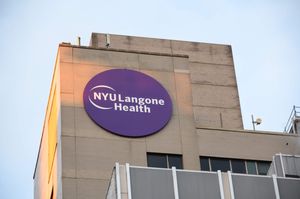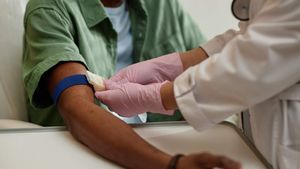September 27 2010 12:00 AM EST
Treatment GuideJust DiagnosedSex & DatingAfrican AmericanStigmaAsk the HIV DocPrEP En EspañolNewsVoicesPrint IssueVideoOut 100
CONTACTCAREER OPPORTUNITIESADVERTISE WITH USPRIVACY POLICYPRIVACY PREFERENCESTERMS OF USELEGAL NOTICE
© 2026 Pride Publishing Inc.
All Rights reserved
All Rights reserved
By continuing to use our site, you agree to our Privacy Policy and Terms of Use.
Twelve scientific teams in more than a dozen states will receive National Institutes of Health grants to study effective ways to prevent and treat HIV among people in the criminal justice system.
The grants, announced September 23, will be awarded primarily by the National Institute on Drug Abuse, with additional support from the National Institute of Mental Health and the National Institute of Allergy and Infectious Diseases, all components of NIH. The research will take place over a five-year period.
"These important and wide-reaching research grants will focus on identifying individuals with HIV within the criminal justice system and linking them to highly active antiretroviral therapy during periods of incarceration and after community reentry," NIDA director Nora D. Volkow says. "We hope this effort will lead to decreased AIDS-related illness and death among those in the criminal justice system as well as decrease HIV transmission in the community at-large, making an important impact on public health."
The seek, test, and treat funding opportunity follows NIH-sponsored research conducted over the past few years that has indicated that identifying and offering treatment to all medically eligible HIV-positive individuals cannot only stop progression to AIDS and AIDS-related death but can also help to prevent HIV transmission. These new grants will apply this strategy to the criminal justice system, where there is a high prevalence of HIV and often poor access to treatment.
The newly funded research will compare different modalities of the seek, test, and treat strategy to identify, test, engage, and retain HIV-positive offenders in treatment. Some of the projects will create and compare systems to better integrate and coordinate HIV management efforts within jails, prisons, health departments, universities, and community organizations. The grants will also support randomized controlled trials among large groups of HIV-positive parolees and probationers comparing varied approaches for linking them to screening, treatment and social services in their communities.
"We are learning that treatment can be one of the most powerful forms of prevention," NIMH director Thomas Insel says. "But treatment of HIV-infected men and women during or after incarceration is a challenge, especially when many have co-occurring mental or substance abuse disorders. We know that patients will stay connected to HIV care if their mental health improves. NIMH's project involves intensive case management for African-American and Latino parolees in Oakland, Calif."
The grants will support research in a diverse group of jails and prison systems, including the Los Angeles County Jail; the Cook County Jail in Chicago; the Rikers Island correctional facility in New York City; jail facilities in Washington, D.C., as well as prison systems in Illinois, North Carolina, Texas, Wisconsin and Rhode Island. One of the grants will compare levels of care and adherence to HAART treatment among HIV-positive injection-drug using detainees in Hanoi, Vietnam, a city with a high rate of HIV infection related to drug use. Two of the projects will study the effectiveness of medication used to treat heroin addiction among HIV-positive injection drug users who are transitioning to home communities.
From our Sponsors
Most Popular
“So much life to live”: Eric Nieves on thriving with HIV
September 03 2025 11:37 AM
It’s National PrEP Day! Learn the latest about HIV prevention
October 10 2025 9:00 AM
Amazing People of 2025: Javier Muñoz
October 17 2025 7:35 PM
“I am the steward of my ship”: John Gibson rewrites his HIV narrative
September 16 2025 2:56 PM
Plus: Featured Video
Latest Stories
HIV-positive men stage 'Kiss-In' protest at U.S.-Mexico border
December 01 2025 12:56 PM
What the AIDS crisis stole from Black gay men
December 01 2025 6:00 AM
The Talk: Owning your voice
August 25 2025 8:16 PM
The lab coat just got queer
August 21 2025 10:00 AM
Messenger RNA could be the key to an HIV vaccine — but government cuts pose a threat
August 20 2025 8:02 AM
The Talk: Beyond the exam room
August 13 2025 3:15 PM
The Talk: Navigating your treatment
August 01 2025 6:02 PM
The Talk: Starting the conversation
July 25 2025 4:47 PM
Thanks to U=U, HIV-positive people can live long, happy, healthy lives
July 25 2025 2:37 PM
How the Black AIDS Institute continues to fill in the gaps
July 25 2025 1:06 PM
“I felt like a butterfly”: Niko Flowers on reclaiming life with HIV
July 23 2025 12:22 PM
Dancer. Healer. Survivor. DéShaun Armbrister is all of the above
July 02 2025 8:23 PM
BREAKING: Supreme Court rules to save free access to preventive care, including PrEP
June 27 2025 10:32 AM
1985: the year the AIDS crisis finally broke through the silence
June 26 2025 11:24 AM
VIDEO: A man living with HIV discusses his journey to fatherhood
June 10 2025 4:58 PM
Trump admin guts $258 million in funding for HIV vaccine research
June 03 2025 3:47 PM

































































